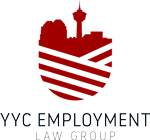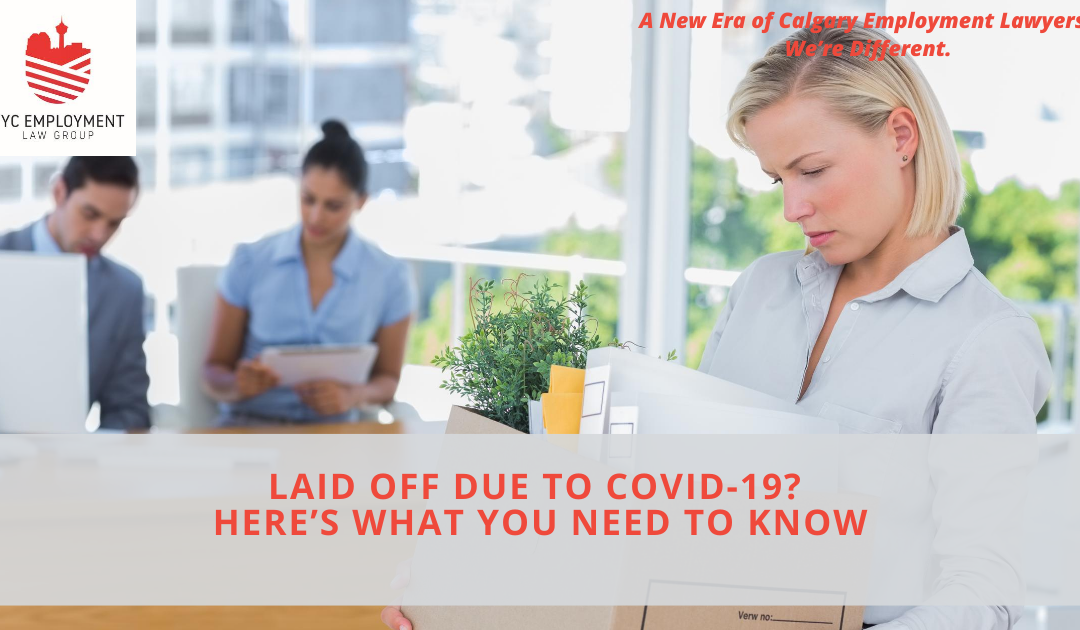Laid off due to COVID-19? Employment lawyers Calgary and Calgary wrongful dismissal lawyers explain what you need to know
If you’ve been laid off due to COVID-19, here’s what you need to know about your rights including your entitlement to severance or termination pay. Due to the current state of Alberta’s struggling economy amid the COVID-19 pandemic, we continue to see many Alberta-based employees laid off, all with many questions about their rights. In fact, many employers are misinterpreting their obligations during these unprecedented times so this makes consulting with an employment lawyer that much more important.
The Alberta Employment Standards Code (the “Code”) is the non-unionized employment legislation for the province of Alberta including provisions for temporary layoffs. Most Alberta-based employees fall under the Code. On April 6, 2020, the Government of Alberta announced some changes to the Code to address the impact of COVID-19 on employers and employees.
Temporary Layoffs in Alberta Due to COVID-19
A temporary layoff is when an employer must “pause” the employment relationship with an employee temporarily, but wishes to maintain that relationship for the near future. It is not necessarily an employment termination but may have the practical effect of ending the employment relationship in select circumstances so it is important to consult with an employment lawyer.
Employers are required to give written notice of a temporary layoff. In unforeseeable circumstances like COVID-19, notice is to be given “as soon as is practicable”.
Employees are generally not entitled to pay during a temporary layoff period, but the employer may recall the employee to return to work via written notice at any time during the temporary layoff period. You would then have 7 days to return to work. If you fail to return within that time, you may be considered terminated and your right to termination pay under the Code could be unfavorably affected. Nevertheless, even in these circumstances, your right to common law severance may still be preserved.
In Alberta, for COVID-19-related layoffs, the temporary layoff period has been extended from 60 days to a maximum of 180 consecutive days. This means that, if you’ve been laid off due to COVID-19, your employer still has obligations to you for the first 180 days of that layoff period.
Temporary layoff changes to the Code apply to COVID-19-related layoffs that began on or after March 17, 2020.
What Happens at the End of the Temporary Layoff Period?
Your employer is not required to give you your job back at the end of the temporary layoff period. If they are still not in a position to hire you back, their options include:
- Further extending the temporary layoff period by coming to an agreement with you to provide you with employee benefits, wages, or an amount instead of wages.
- Transitioning you to an unpaid leave of absence. This must be done in collaboration with you. As long as the CERB is in effect, this is probably the most attractive option for both employer and employee.
If you’re still laid off on day 181, you would be considered a terminated employee under the Code and your employer’s obligations are no longer in effect, but other obligations will be triggered (unless a further extension is allowed under the terms of the Code). Even in this case, your employer is required to provide written notice of termination or termination pay, and you may still be entitled to additional common law severance or pay in lieu of notice.
Your Right to Compensation During a Temporary Layoff
Under the Code, your employer is not obligated to pay you during your temporary layoff period. If you have insurable hours, you may qualify for Employment Insurance Benefits. The Government of Canada and the Alberta Government have developed other financial assistance programs for which you may qualify:
- Support for Alberta credit union members and ATB Financial customers
- Education property tax freeze
- Student loan repayment deferrals
- Utility payment deferrals
- Employment insurance sickness benefits
- Canada Emergency Response Benefit
- An extra $300 per child in May for the Canada Child Benefit
- A one-time GST rebate increase in May
- Eased rules for Registered Retirement Income Funds
You can learn more about the federal programs here and the provincial programs here.
Wrongful Dismissal
The changes to the Code take into account the unusual circumstances caused by COVID-19. The provisions are helpful for employers who need extra time to rebuild their business or who cannot afford termination pay. Even with these provisions, wrongful dismissal is still possible at common law under the terms of your employment agreement.
For example, your current employment agreement should have a clause that gives your employer the right to temporarily lay you off. If that clause doesn’t exist, you may have the right to a constructive dismissal or wrongful dismissal claim.
The language in your current employment agreement matters. It’s possible that the terms in that agreement could supersede those of the Employment Standards Code.
Know Your Rights When Laid Off Due to COVID-19
It’s important to understand your rights when you’re laid off due to COVID-19, but the intricacies of the law can sometimes be confusing. Have a lawyer review your employment agreement or your layoff letter so you can be sure you’re being treated fairly.
Do not sign any documents from your employer (such as a release letter or severance offer) until consulting with a lawyer!
Employment lawyers Calgary at YYC Employment Law Group can review your:
- Employment contract
- Layoff letter
- Severance package
We can also give you clarity about what to expect going forward and help you determine what compensation you may qualify for. Our lawyers are committed to using plain language to demystify your rights as an employee in Alberta.

